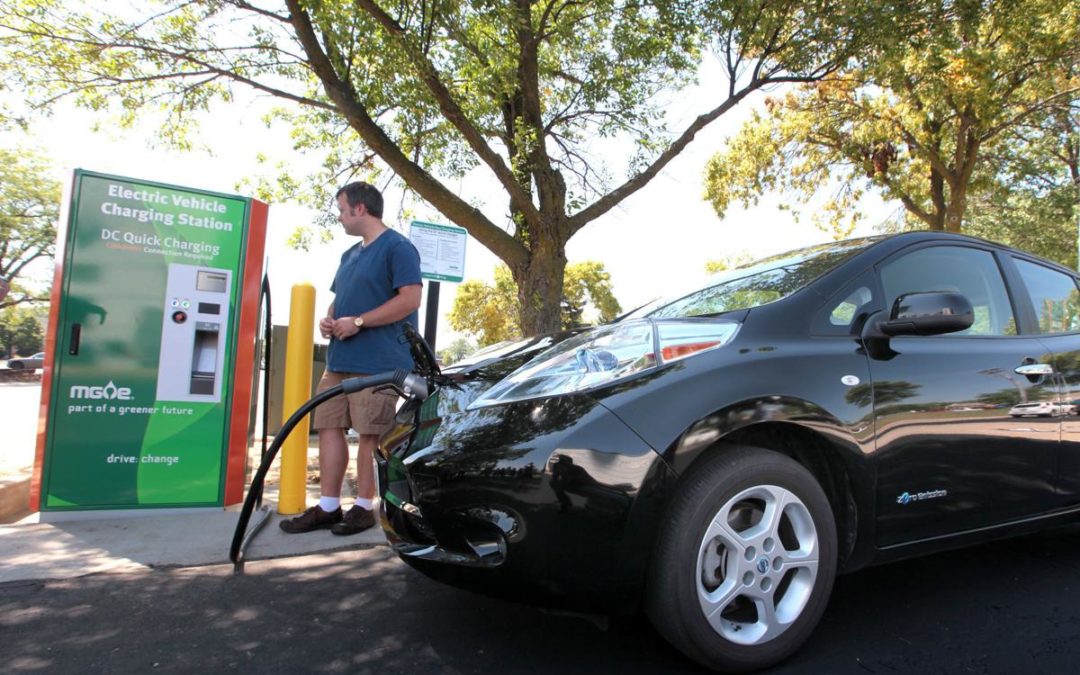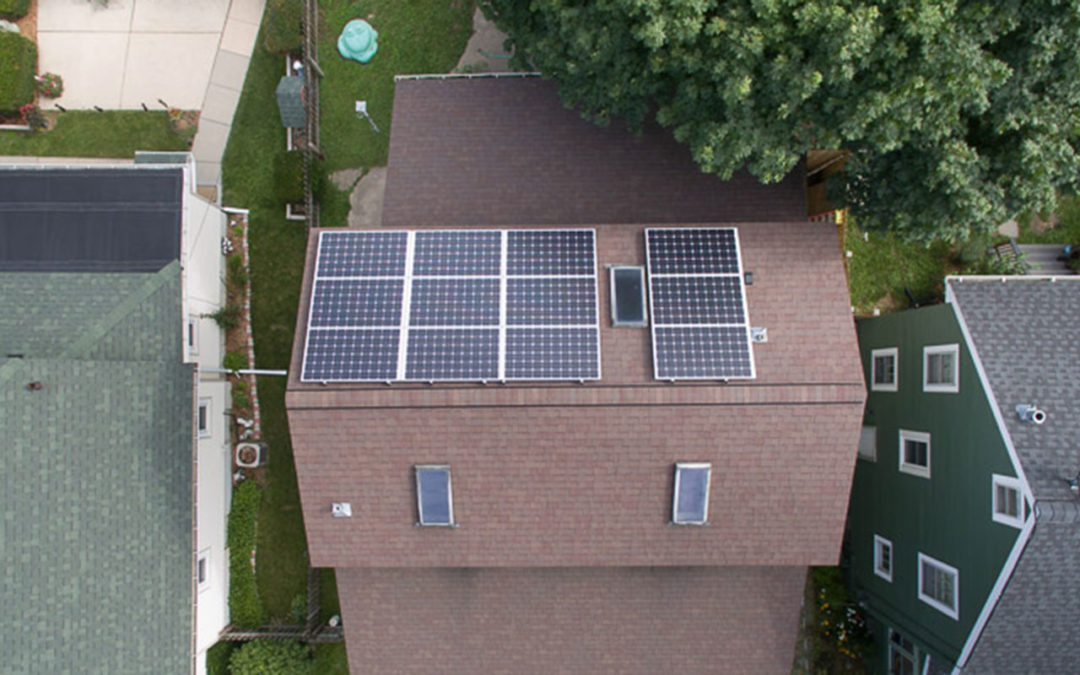
by Tyler Huebner | May 23, 2019 | Advocacy, Public Service Commission, RENEW Wisconsin, Renewables, Solar, Utilities
On May 3rd, We Energies filed an unfortunate proposal that would effectively tax their customers who make power for their own use with solar panels or other renewable energy systems.
We Energies’ proposal, filed as part of their rate case at the Public Service Commission, revives a nearly-identical approach which was rejected by a Circuit Court Judge in 2015.
This time around, they’ve named their tax the “Fixed Cost Recovery Charge.” It would assess a charge of $3.53 per kilowatt of solar production, or about $180 per year for the average residential solar installation by We Energies’ estimation. This would mean a reduction of 20-25% of the expected dollar savings from a typical solar installation.
The charge would be $3.67 per kilowatt for small commercial customers, and We Energies stated they are planning to propose a similar charge for larger commercial and industrial customers which has not yet been formally filed.
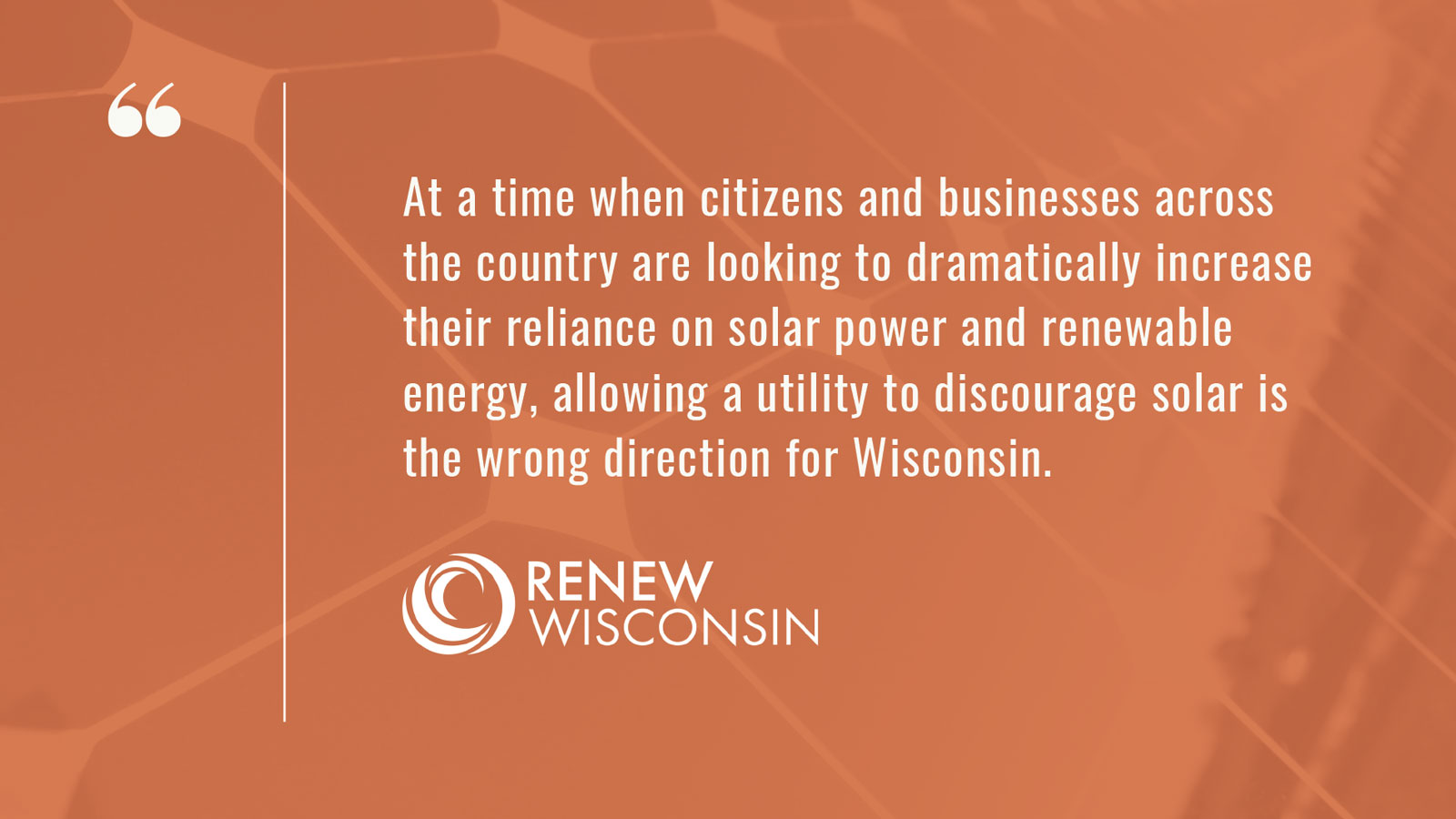
This Proposal is Out of Step and Bad for Wisconsin
Just last month, very similar charges were rejected by the Michigan Public Service Commission and failed to pass in the Iowa House of Representatives. The Michigan PSC said the proposed charge was not based on the cost of serving customers and was thus unreasonable. In Iowa, a wide coalition, including the Iowa Pork Producers, opposed the “sunshine tax” and it failed to pass before the Legislature adjourned for the year.
At a time when citizens and businesses across the country are looking to dramatically increase their reliance on solar power and renewable energy, allowing a utility to discourage solar is the wrong direction for Wisconsin.
Let’s Support Investments in Solar and Renewable Energy, Not Penalize Them
There are so many reasons to support solar power and oppose this solar tax!
- Solar is a growing industry in Wisconsin. The industry already employs over 3,000 Wisconsinites, and it’s just getting started.
- Homegrown energy keeps our money in Wisconsin. According to the U.S. Energy Administration, Wisconsin ratepayers spent $700 million on natural gas and $893 million on coal to generate electricity in 2017. This is money sent out of state, since we have no coal or natural gas reserves. We should be encouraging private investments in homegrown energy generation like solar that keep our money in Wisconsin.
- Clean energy brings economic development. Leading businesses across Wisconsin and the country increasingly want access to renewable energy. It’s going to be harder to attract these job creating businesses if our utilities are allowed to discourage them from investing in renewable energy solutions.
- We should encourage private sector investment. Individuals and businesses putting their own money into solar power and renewable energy systems is a good thing, and should not be penalized or discouraged.
- Solar helps keep energy costs down. With solar power, customers are providing peak power on those hot sunny days when we need it most. Every dollar invested by a person or business to generate their own energy lowers the demand on the entire system, and reduces the need for everyone to pay for more power plants and transmission lines to meet higher peak energy demands.
- ALL solar is good. We Energies itself is starting to offer solar power programs for some of its larger customers, and telling investors they plan to reshape their power generation to include more solar. We completely agree that We Energies should be maximizing the benefit of solar. But they can’t discourage solar while simultaneously talking about how great it is. “What’s good for the goose is good for the gander.”
- Solar helps families and businesses cut costs and manage expenses. Solar power has become an affordable way to save money for many families and businesses. We need to make sure farmers, residents, businesses, and even our local governments have the opportunity to take advantage of the cost savings from solar and renewable energy.
- Solar promotes cleaner air and water, now and into the future. Right now, Wisconsin is still using coal for 50% of our power! We all know that leads to air pollution and that coal emits carbon dioxide. Solar power systems located on homes and businesses, and owned by Wisconsin citizens and businesses, can help clean up our air and water now and for generations to come.
More information can be found at wisolarcoalition.com. The Wisconsin Solar Coalition is a growing alliance of nonprofits, businesses, and individuals.
Please join us by taking action today! Sign our petition opposing We Energies’ proposal to tax solar panel owners.
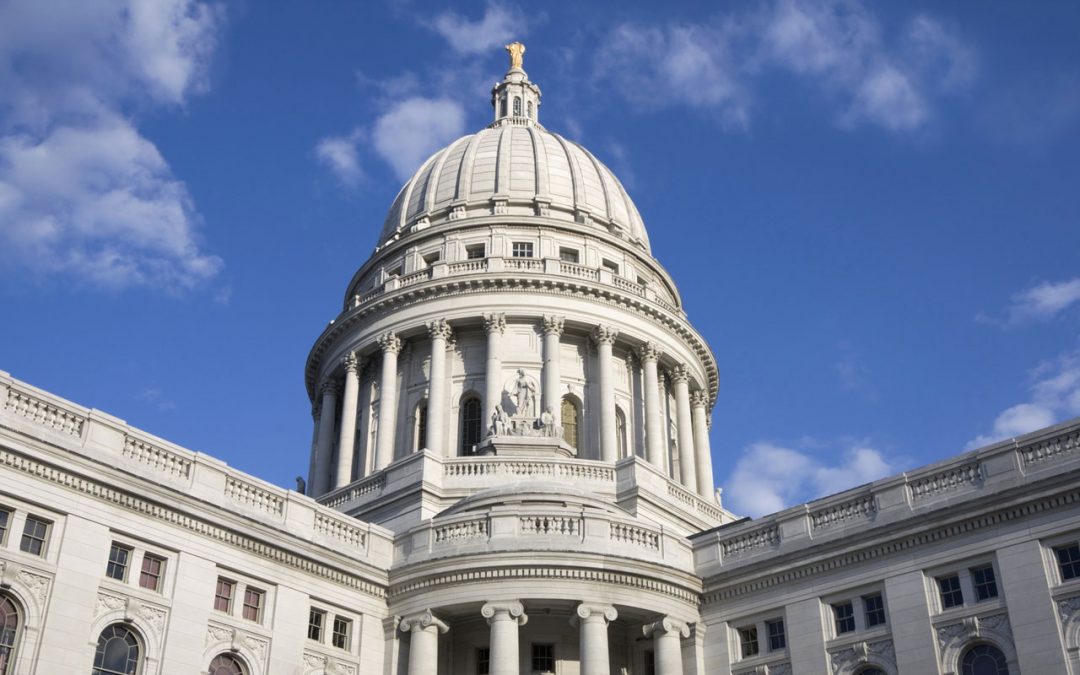
by Jim Boullion | Mar 13, 2019 | Advocacy, Electric Vehicles, Focus on Energy, Policy, Renewables
On February 28, Governor Tony Evers released his 2019-2021 state budget. The budget bill will now go to the Joint Finance Committee who will review it and get briefings on the various provisions from the Governor’s administration and specific state agencies. The committee will also hold a series of hearings around the state to learn what the general public thinks about the budget bill provisions. By statute, the budget bill is supposed to be complete by July 1st, but that date is not often met, regardless of which party holds power. Between now and then, please contact your state legislators and let them know what you think about the various provisions of the bill. You can find your legislator’s contact information by following this link.
Below is a short summary of the Governor’s proposals related to clean energy.
100% Carbon-Free Goal
Establishes a state goal that all electricity produced within the state should be 100 percent carbon-free by 2050. While not a mandate or requirement, writing this goal in Wisconsin’s statutes will help state agencies, the legislature and the public know what we are trying to achieve.
Allocate $75 million in bonding to fund energy conservation projects on state-owned facilities. $25 million of these funds would be allocated to renewable energy projects.
These funds will be used for energy conservation projects to help state agencies and UW System meet their energy reduction goals and reduce utility costs. Renewable projects could include solar, wind, standby generators or geothermal enhancements to state facilities. The achieved savings from the reduction in utility costs would be used to pay the debt service payments on the bonds.
Focus on Energy
Allows the Public Service Commission to increase funding for the Focus on Energy program beyond the current statutory limit of 1.2 percent of utility revenues. The bill also requires the PSC to submit to the Joint Finance Committee a proposal for spending a greater percentage on the programs than is currently allocated (The amount is to be determined by the PSC).
Create the Office of Sustainability and Clean Energy
Transfer the State Energy Office and its employees from the PSC to the Department of Administration. The new office would:
- Administer a $4 million clean energy research grant.
- Advise state agencies in developing sustainable infrastructure to reduce energy use.
- Study and report on the status of existing clean and renewable energy efforts by the state.
- Serve as a single point of contact to assist organizations pursuing clean energy opportunities.
- Identify clean energy funding opportunities for private and governmental entities.
- In coordination with other state agencies, collect and analyze data needed for clean and renewable energy planning and review those plans with the governor and legislature.
Use a Portion of VW Settlement Funds for EV Charge Station Grants
Spend $10 million of the remaining $25 million from the Volkswagen emissions settlement on grants for electric vehicle charging stations. The rest would be dedicated to replacing public transit vehicles. $42 million of the original $67.1 million that Wisconsin was allocated from the settlement was spent in 2017-19 for replacement of state vehicles and the transit assistance program.
Hybrid Vehicle Registration Fees – Definition expanded to include all hybrids, not just PHEV’s
All hybrid vehicles (any vehicle that uses a battery to increase mpg) would pay the additional $75 annual fee that was originally designed to cover only Plug-in-Hybrid vehicles. This is in addition to the proposed $96 (up from $75) annual vehicle registration fee paid by all vehicles. All-electric vehicles would continue to pay the additional $100 annual fee that was already in the statutes. The fee is designed to recover the sales taxes that would have been paid if they were powered by gasoline that is used to support the transportation budget.
WEDC Tax Credits for Energy Efficiency or Renewable Energy
WEDC would be allowed to award business tax credits of 5% for investments made on projects that improve energy efficiency or that generate energy from renewable resources.
Ratepayer Advocate (Intervenor Compensation) Grants
The bill increases from $300,000 to $500,000 the annual grants the PSC is allowed to make to nonprofit corporations that advocate on behalf of utility ratepayers.
If you have any questions or would like more information about any of these energy related issues please contact Jim Boullion, RENEW Wisconsin’s Director of Government Affairs.
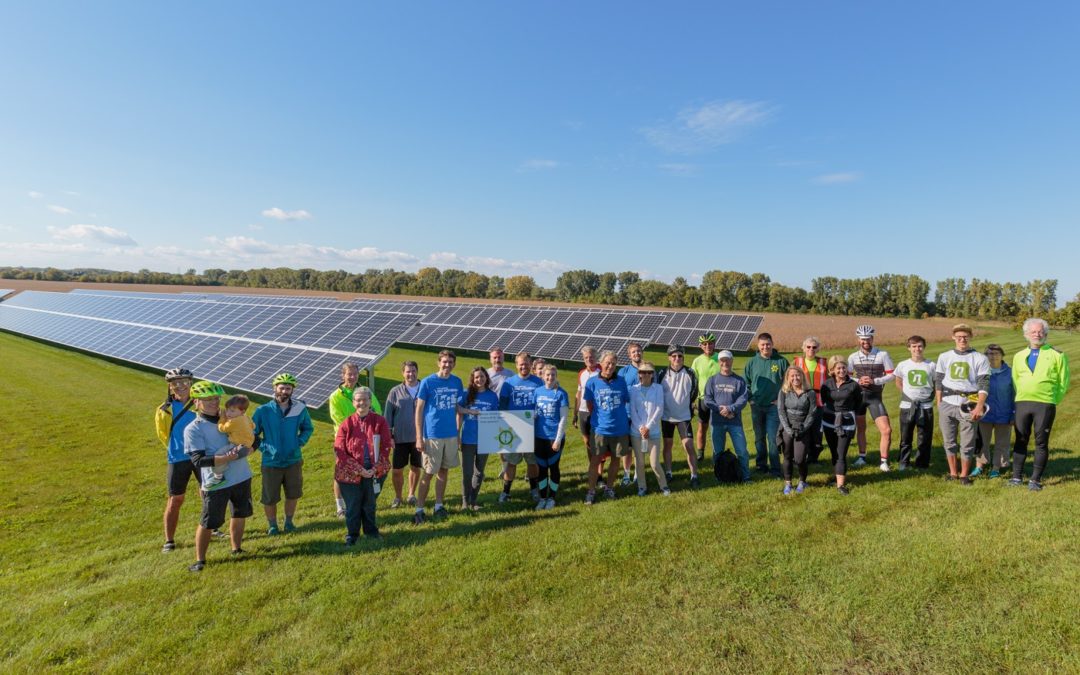
by Michael Vickerman | Oct 16, 2018 | Advocacy, Biogas, Focus on Energy, Programs, RENEW Wisconsin, Renewables, Solar, Wind
For many years, Focus on Energy’s renewable energy incentive program has labored under an operating environment resembling a regulatory roller-coaster. It has weathered funding suspensions, mid-stream budget reallocations, and an effort to replace rebates with loans.
But that extended wild ride is finally coming to an end, the result of Public Service Commission orders that will restore stability and consistency to Focus’s renewable energy offerings.
The PSC’s ruling in June 2018 locked in $22 million in renewable energy incentives for the 2019-2022 funding cycle, split equitably between residential and business customers. That allocation amounts to a funding increase of $4.7 million, or 27%, over the previous four-year cycle. In addition, the order granted flexibility to move funds between residential and business customers to better ensure all the funding is utilized.
A subsequent order in September 2018 locked in improvements to the business program, including a streamlined application process, a guarantee of request-for-proposals issued three times per year, and a funding set-aside for mid-size projects (between 20 and 100 kilowatts for solar power projects).
We are starting to see the results of these positive decisions!
The business program has an RFP on the street with applications due next week, on Tuesday, October 23rd, for the first round of projects that will be installed in 2019.
All in all, the PSC’s decisions tracked closely with the recommendations submitted by RENEW and its member businesses regarding funding levels and program design.
But before we dive into how it happened, RENEW wishes to thank PSC Chairperson Lon Roberts and Commissioners Mike Huebsch and Rich Zipperer for their votes in support of a strong, predictable, and consistent renewable energy program for Focus on Energy!
We would also like to thank the Commissioners’ Executive Assistants and the Commission’s Focus on Energy staff team for the role they each played in setting up success for 2019 through 2022.
The Anatomy of the Victory
Our goals for the 2018 planning process were twofold: first, to lock in a stable and well-funded operating environment for renewables; and second, to integrate needed process improvements to the incentive program targeting commercial installations. Our member businesses assisted us in formulating these recommendations which were based on an assessment of recently adopted tax and trade policies and their likely effects on customer appetite for onsite renewable generation.
Our success was made possible by the participation of several influential constituencies that weighed into the formal planning docket. For the first time in Focus on Energy’s history, associations representing general contractors, builders, and architects voiced their support for a well-funded renewable energy program. Drawing upon his background representing contractors at the Capitol, Jim Boullion, RENEW’s Government Affairs Director, was instrumental in engaging these groups to submit a letter conveying their support for continuing current funding levels over the next four years.
In addition, renewable energy businesses and associations across solar, biogas, and geothermal technologies weighed in with support. These businesses span the entire state, which helped us make the point that the renewable energy program serves rural and urban areas.

Geographic Representation of Signatories
Our success in 2018 was also made possible by RENEW’s organized media outreach and recognition swings across Wisconsin from 2015 through 2017. Those events highlighted the increasing appeal of rooftop solar for commercial customers, school districts, and agricultural producers, and called attention to the Focus on Energy incentives that moved these installations to completion.
The ribbon-cuttings and award ceremonies in locations such as Racine, New Berlin, and Darlington proved effective in generating positive coverage from the press. RENEW complemented that effort with analysis documenting the renewable program’s statewide reach and effectiveness in supporting Wisconsin businesses, both at the customer and contractor level.
That effort first bore fruit in October 2016, when the PSC decided to scrap the sputtering loan program and replenish the incentive budget for 2017 and 2018 with unspent loan dollars totaling more than $8.5 million. With that commitment in place, renewable energy businesses could bank on a relatively stable and adequate funding base, and break free of the fits and starts that had hampered their ability to meet growing customer demand.
Getting the 2017 and 2018 programs in place and, through our members, showing them to be successful gave us a strong negotiating position to showcase “what is working” and to advocate for continued rebate funding for 2019-2022.
In the end, it was a combination of RENEW’s strong advocacy on behalf of our member businesses and allies, and the PSC’s desire to see the program succeed that led to this positive outcome. We are fortunate to have so many actively engaged members who understand the value of speaking up with a unified voice.
Said RENEW Executive Director Tyler Huebner: “The Commissioners definitely heard the collective comments of our industry and stakeholders to make the renewable energy program as streamlined and business-friendly as possible. RENEW Wisconsin will continue to work with the Commission, PSC staff, and the Focus on Energy program administrators to make the programs simple for customers and the renewable energy marketplace, while ensuring cost-effective outcomes.”
Once again, thank you to our Members and Stakeholders who supported our positions, and to the PSC Commissioners, Executive Assistants, and Staff who all played instrumental roles in this process.
We look forward to a strong Focus on Energy renewable energy program for 2019 through 2022!
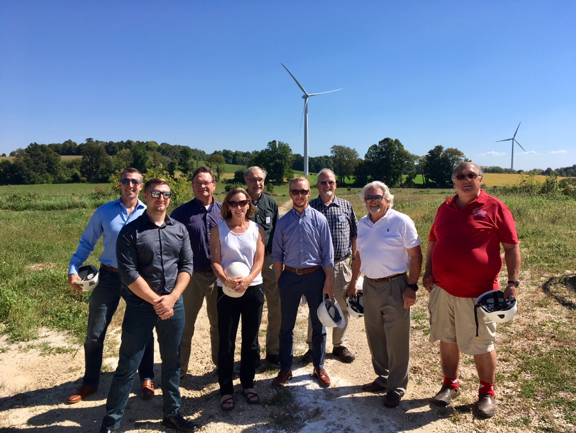
by Jim Boullion | Oct 2, 2018 | Advocacy, Biogas, Electric Vehicles, Events, Jobs, Policy, RENEW Wisconsin, Renewables, Solar, Utilities, Wind
September was a busy month for me and RENEW Wisconsin. I attended more than 30 meetings, seminars and site visits all over the state. Many of them involved learning about Wisconsin’s exciting and fast growing renewable energy industry and building relationships with the talented people who help make it go. There were also numerous meetings with state and local policy makers as well as the leadership of many influential trade associations, unions and advocacy groups. Working together, we are starting to develop ideas for the 2019-20 legislative session that will help advance the use of clean, renewable energy that will create jobs, economic growth and save money for everyone!
Customers First! Power Lunch – Go Electric!
September got off with a “high voltage” start at the Customers First! Coalition Power Lunch, with the theme of “Go Electric”. Over 120 attendees learned about the latest developments and benefits of electric vehicles and “efficient electrification” – replacing direct fossil fuel use with electricity in a way that reduces overall emissions and energy costs. Efficient Electrification holds significant potential benefits for Wisconsin customers, utilities, and environmental advocates alike. PSC Chairman Lon Roberts gave the opening keynote speech and several panels with utility executives and state legislators Mark Spreitzer (D-Beloit) and Mike Kuglitsch (R-New Berlin) dove deeper into the technical and policy issues that will need to be addressed to keep up with these fast-growing trends. The program was interesting enough that WisconsinEye, the not-for-profit State Capitol broadcast network, recorded the event.
Emmi Roth Solar Panels
On September 11th I joined State Representative Travis Tranel at the Emmi Roth Cheese plant in Platteville to cut the ribbon on their new 1,600 panel solar system. The system will provide 15% of their electric use. “There are many companies trying to live up to sustainability goals,” said Jim Pullen, General Manager at Eagle Point Solar, who installed the system. “Emmi Roth is part of a group that actually makes these goals a reality and invests in the environment.” The company also recently invested in a new anaerobic digester at the same location in Platteville, Wisconsin, in an effort to lower operational costs and remain environmentally responsible for the waste being produced during their cheesemaking operations. According to Tim Omer, president and managing director at Emmi Roth, “We have a very strong commitment to sustainability. We want to have the lowest possible carbon footprint we could have in the industry.”
Butler Ridge Wind Farm
On September 17th, Pauline Meyer and Nic Cravillion, policy staff from Congressman Mike Gallagher’s office, and Dodge County Board member Russ Kattke joined me at a tour of the Butler Ridge Wind Energy Center in Dodge County. This was a behind the scenes tour of one of Wisconsin’s premier wind farms and was hosted by NextEra Energy Resources. Butler Ridge’s 36 turbines generate 54-megawatts of clean, renewable energy to power more than 13,500 homes. Wisconsin based Faith Technologies, who installed the ground grid and in-tower wiring, and The Boldt Construction Company were two of the prime contractors on the project.
Conservative Energy Forum Summit on “Advancing Wisconsin’s Clean Energy Economy” and Clean Energy Week Proclamation by Governor Walker
On Thursday, September 27th the Wisconsin Conservative Energy Forum hosted a summit onclean energy developments in Wisconsin. PSC Commissioner Lon Roberts opened the meeting discussing the bright future of renewable energy. Several guest panels discussed Utility Scale Clean Energy – A Turning Point for Wisconsin Utilities, and Decentralizing Energy & Encouraging Private Sector Investment. Lt. Governor Rebecca Kleefisch also spoke about the great things happening for clean energy in Wisconsin and how renewable energy fits so well into a conservative political viewpoint. At the end of her talk, Kleefisch presented a proclamation from Governor Scott Walker designating September 24th to September 28th as Clean Energy Week in Wisconsin. This echoed the clean energy week activities around the country.
